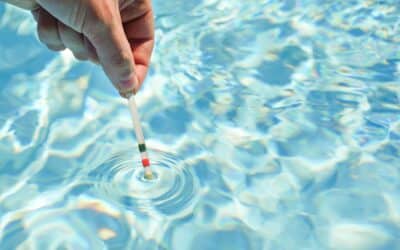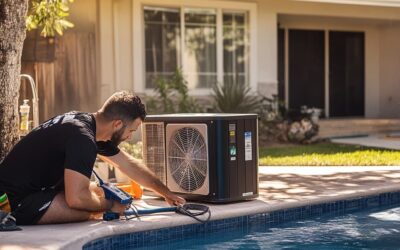Consistent Changes with Water Level
The number one sign that indicates a potential leak is noticeable water loss. This will naturally happen due to evaporation, varying with wind conditions, humidity, heat and splashing when getting in or out of the pool. However, consistent changes with the water level can also pinpoint a leak. To determine the difference, you can use an online evaporation calculator which will show you the average amount of water loss based on the data you input. If you have a lower level than the number produces, it could highlight a leak.
Also, if you use an automatic fill device in your pool to maintain a consistent water level and it’s kicking in more frequently, this can be an indication too.
Unusually High Water Bills
A sudden spike in your monthly bills could also be a sign that there’s something wrong with your pool. If you notice higher than normal water bills, it’s a good time to investigate.
Cracks in the Tiling
If you’re concerned that your pool is leaking, look for gaps around fittings, cracked flanges, cracks in the skimmer, and holes in the liner. If you have a concrete pool, you should also look for cracks in the concrete or loose plaster.
Uneven Grass Growth Around Pool
When water leaks from the pool into the ground, it can create erosion, gradually softening the surrounding areas throughout the landscape. Take note of any mushy or unusually soft spots along the lawn or any nearby areas close to the pool. Any wet spots in the yard that are out of place and near the poolscape should be looked at.
Dripping at a Fitting, Water Leaking Out the Backwash/Waste Line or Puddles
Another sign of a leak is when puddles of water surround the pump or if there are white calcium deposits on equipment. This can be a serious problem if it’s not addressed, which is why we recommend having your pool equipment thoroughly inspected and repaired as soon as possible.
Algae and Mildew Growth
When your pool’s water level needs frequent top-ups, this can offset the balance of chemicals that are needed to prevent certain bacteria growth from happening. Algae growth or mildew can occur in this case which can indicate that there’s more untreated water in the pool than there should be. If you’ve been filling up the pool and notice more algae as a result, it’s a good time to look for a potential leak.
Gurgling Sounds and Dirty Water
Is your pool making gurgling sounds? Or maybe you’re seeing more dirt in the water and aren’t sure where it’s coming from. This can be caused by a leak in the plumbing, where dirt and air get into the system and creates weird sounds or the presence of dirt.
Some leaks can be easy to identify, especially if it’s a direct cause of equipment that you can see, such as the pump. But in other situations, it may not be as simple to source. If you’re unsure how to determine if your pool is leaking, give us a call at Benson Pools. We’ll send out one of our pool technicians to inspect the pool thoroughly to get to the bottom of the problem and repair it if necessary.


